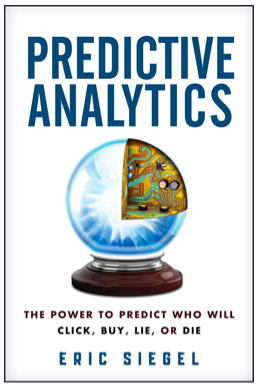
In light of recent revelations of wholesale spying on American citizens by the National Security Agency (NSA), significant media attention has focused not only on how much data is being collected and under what authority it was being collected in the first place, but on the potential uses of that crucial private information by the agents of the federal surveillance state.
In a timely book on the subject, author Eric Siegel reveals the power and peril of predictive analytics.
Siegel, a former Columbia University professor, describes in his book, Predictive Analytics: The Power to Predict Who Will Click, Buy, Lie, or Die, how government, law enforcement, hospitals, and businesses use technology to track and predict the behavior of everyone, everywhere. Predictive analytics is the science that turns raw data into useful information.
With this technology, computers literally learn from data how to predict future behavior of individuals. In business, this ability to predict — which is based on the patterns distinguished within the data — helps businesses make informed decisions and identify risks and opportunities.
“Data embodies a priceless collection of experience from which to learn. Every medical procedure, credit application, Facebook post, movie recommendations, spammy e-mail, and purchase of any kind — each positive or negative outcome, each successful or failed event or transaction — is encoded as data and warehoused,” Siegel explained. “As data piles up, we have ourselves a genuine gold rush. But data isn’t the gold — data in its raw form is boring crud. The gold is what’s discovered therein. With the new knowledge gained, prediction is possible.”
No one values this data as much as the domestic surveillance apparatus. The federal government knows it can use this ability to aggregate data and plot patterns to identify and label individuals it considers potential threats to the homeland. This is precisely, the Obama administration claims, the purpose of the surveillance conducted on millions of innocent Americans by the NSA and others.
The dragnet nature of the surveillance completely disregards the “probable cause” requirement of the Fourth Amendment and makes every citizen a suspect and subordinates the Constitution into nothing more than a relic trumped by secret court orders and executive directives.
Predicting human behavior can be helpful, but the potential harm is significant. Information that is a boon to advertisers and retailers can cause irreparable harm to civil liberty.
The full spectrum of possible applications of this technology must be understood in order to avoid allowing government or law enforcement to use predictive analytics to train the never-blinking eye of government surveillance on innocent people (as in the case with the NSA-Verizon operation and the PRISM program) caught in a Minority Report-style dragnet.
Recently, this reporter conducted a telephone interview with Siegel to inquire about the methods used to collect the data and to ask his learned opinion about the manifold ethical, legal, and constitutional issues involved in such surveillance and data collection.
The New American: Often, predictive analytics as described in your very informative book is used by law enforcement to identify potential high-crime areas in order to direct limited resources toward those areas. When that technology is turned to people, however, isn’t there a violation of constitutionally protected privacy?
Eric Siegel: Yes, likely there is. This use would be an injustice. The ethical issue we deal with in cases like the one you’re describing is that humans are trusting computers as an advisor. Humans must decide how and whether to give credence to the information the computer provides.
TNA: Another constitutional issue that arises when a person is arrested based on predictive analytics derived from computer data is the right guaranteed by the Sixth Amendment to one accused of a crime to confront his accuser. How can a person confront — constitutionally — a computer?
Siegel: That’s an interesting question. The computer is not an agent; it is a tool. The humans that collect and consider the data should be accountable and are the actual accusers.
TNA: It seems, Dr. Siegel, that underlying predictive analytics is the sacrificing of the civil liberties of the individual in favor of the possibility that the safety of the many will be increased.
Siegel: Ultimately, people who program the computer to collect the data upon which predictive analytics is applied must be held accountable. The computer itself will never be perfectly accurate and thus there will always be the need for human interaction with the computer and interpretation of the data it gathers. That preserves the moral aspect of predictive analytics when applied to the behavior of human beings.
TNA: What is the relationship between predictive analytics and government electronic surveillance and acts seeking control of the Internet such as the Cyber Intelligence Sharing and Protection Act (CISPA) passed in April by the House of Representatives?
Siegel: CISPA fans the flames to provide incentive to government to collect and aggregate more and more data. We need to decide as a society if we want to use this data. There is value in certain of these endeavors if they can be put to use in a way that will not infringe on civil liberties.
When it comes to the potential uses these data can be put to by a federal government bent on placing every movement, every word, every electronic communication under constant surveillance, there is no room for compromise. Enshrined within the Constitution are protections for the God-given rights:
The right of the people to be secure in their persons, houses, papers, and effects, against unreasonable searches and seizures, shall not be violated, and no warrants shall issue, but upon probable cause, supported by oath or affirmation, and particularly describing the place to be searched, and the persons or things to be seized.
Probable cause, supported by oath or affirmation, is still the standard. Although companies may skirt this standard, the federal government may not, as the Constitution was written to restrain government and keep it from putting another long train of abuses on the rails that lead to despotism.
It seems that while there may indeed be legal, ethical, and moral uses for predictive analytics, the attempt by agents of the federal government’s spy regime not only to gather information on millions of Americans not suspected of committing any crime but to use that information to predict which of them will become a “terrorist” is immoral, a clear and present threat to freedom, and a direct and inexcusable violation of the Constitution.
Predictive Analytics: The Power to Predict Who Will Click, Buy, Lie, or Die, by Eric Siegel, Ph.D. is published by John Wiley & Sons, Inc. and is available now.
Joe A. Wolverton, II, J.D. is a correspondent for The New American and travels frequently nationwide speaking on topics of nullification, the NDAA, and the surveillance state. He can be reached at [email protected].



